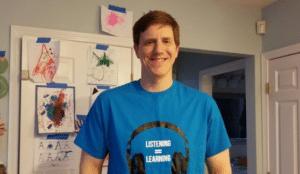Last Updated on June 25, 2021
 Today’s guest post is written by Listenwise Teacher Advocate, Andrew Garnett-Cook. Andrew is a 7th and 8th grade social studies teacher in the Brookline Public Schools in Massachusetts. He teaches Ancient Mediterranean Civilizations and U.S. History. You can read his other Listenwise blog about teaching history with current events here.
Today’s guest post is written by Listenwise Teacher Advocate, Andrew Garnett-Cook. Andrew is a 7th and 8th grade social studies teacher in the Brookline Public Schools in Massachusetts. He teaches Ancient Mediterranean Civilizations and U.S. History. You can read his other Listenwise blog about teaching history with current events here.
As a veteran history teacher, one of my goals is for students to understand that what they read in a textbook is not, and should not be seen as, the definitive and final word on any historical topic or event. Especially when learning about the ancient world, what I try to emphasize is the uncertainty about what is known about whatever civilization we are studying. After all, what we know is based to a considerable degree on what has survived from a civilization and how experts in diverse fields ranging from geology to climatology to archaeology interpret that evidence. In fact, new discoveries often both answer and raise new questions about the past, encouraging us to reexamine what we thought had been settled history. For me, this is what makes learning about the past both challenging and exciting. This should be a mission of any history teacher: To teach about the past in a way that reinforces the fact there is always something new to learn.
This is a big reason why Listenwise is such a valuable tool. Curated stories on Listenwise include several examples of stories having to do with new theories and discoveries that have fundamentally shifted our thinking about the past. One example of such a story, titled “Climate Change and Human Migration”, is a story about how climate science has contributed to our understanding of when early humans left Africa and why. We listened to this story during our unit on early humans. My goal was for students to understand and be able to explain why early humans would have left Africa 100,000 years ago and begun migrating to other parts of the world. Bringing in new research, this story explains the new thinking, which is that climate change substantially contributed to why early humans left Africa. Through this story, students get to explore more deeply how different disciplines contribute to our understanding of the past. The story also allows for students, through close listening, to judge the claims and evidence presented to support them.
Another story on Listenwise that helps students explore new research is the story titled “A New Human-like Species.” This story is about the classification of a new species of human ancestor called Homo Naledi. We also used this story during our unit on early humans. We were learning about “human time” and how early humans are believed to have evolved, starting with australopithecines and going through to homo sapiens. Through this story, students explore how our understanding of human evolution can change based on new information.
While kids could have done these stories for homework, we listened to both of these stories in class. Kids listened, answered discussion questions, and we talked about them both in small groups and as a whole class. Finally, I had students do some reflective writing on how these stories added to their understanding of the past. Both of these stories provide a rich opportunity for my students to dive into new research into the past and explore how people go about the process of interpreting evidence from the past, and how new information can both answer and raise new questions about the past. Our understanding of the past is not settled. New research is being done all the time into the past and the results of that work can force us to shift our thinking about history. Listenwise provides valuable resources for sparking student exploration of new research, engaging them in rich discussions and shaping new understandings of the past.
